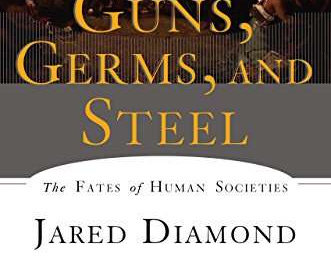Guns, Germs, and Steel (and a LOT of Cope)
Originally posted to iFunny on 04/14/2023. [Oct 24, 2023]
I remember having to read part of this book in sophomore year of high school for AP World History. I didn’t think about it much back then, but now I realize that this book (and Diamond) is really stupid.
And it’s not stupid because it’s wrong, in fact everything the book says IS true. The “thesis” of the book is that Europeans succeeded in conquering Native Americans because of: Guns, Germs, and Steel. But this isn’t a profound revelation, none of this is new or contested information. What Diamond does is argue that Europeans came to possess these three things because of entirely geographic reasons.
What Diamond is arguing is essentially that Europeans conquered the world because they were more technological advanced. But this isn’t something contested by even the most adamantly racist individuals (I would know btw). The point of contention comes along when Diamond argues that all of these things are caused by environmental determinism rather than genetic differences (which in reality are casually related anyways lol).
The crux of his argument comes from Diamond positing the idea that Eurasian (and Europeans in particular) civilizations were able to succeed solely because they had access to fauna and flora that were easily domesticated and geography that was conducive to the formation of large nation states.
Probably the easiest thing to debunk is the notion that the Americas and Africa had worse flora that was not conducive to farming. This is profoundly stupid because:
Corn originates from the Americas
Most of the beans you and I eat today (from the genus Phaseolus) are from the Americas
Potatoes are from the Americas
There are countless other staple crops from the Americas, but you get the picture.
Africa is the source of even more modern staple crops, like okra, yams, and oryza glaberrima (African rice). Frankly it’s kind of stupid, because most of the “European” staple crops he talks about were brought to Europe by Europeans as part of colonialism, which kinda goes against Diamond’s point but whatever. All of these plants were initially much less nutritious but were cultivated (usually by Eurasians) to be much healthier. But I digress and you get the picture; the plants were always there but non-Eurasians find it nigh impossible to figure out how to use them (because of their low IQ).
The same can be said for most domesticated animals as well; the basic foundations for livestock can be found on most continents. Most of these people are just too stupid to figure out how to farm them. Whitey has figured out how to farm all kinds of exotic animals, such as:
Turkeys (you would think Injuns would have figured this out but nope) [Dirty Jobs, S2 E14 and S4 E13]
Foxes [Belyaev Fox Experiment]
Most of Diamond’s arguments are just cleverly disguised examples of begging the question that fall apart upon further scrutiny.
“The Native Americans didn’t domestic livestock because there were no fauna that were easy to domesticate.”
“How do you know there were no fauna that were easy to domesticate?”
“Because we have no accounts of domesticated livestock!”
Do you see the issue here? It’s just ridiculous man. But again, I digress.
One of the most ridiculous notions, however, is that somehow Europe’s unique geography made it best suited for the formation of nation states and thus war, which drove technological innovation. I am not making this up, he literally says this in the book. So lets break down this idea as well. What exactly is unique about European geography, beyond its aesthetic appeal? Do other nations just not have mountains, grasslands, lakes, etc.? No lol. In fact, the grasslands and plains that served as home for the PIE Steppe Warrior Cultures that dominated Eurasia can be found all across the globe. Europe also does not have a monopoly on useful metals, in fact the Americas are a far more rich source of metals like copper than Europe.
Diamond argues that Europe’s geography was what pushed conflict and led to technological innovation, like shipbuilding, steel, guns, etc. So, uh, are we supposed to ignore China’s extraordinarily bloody history (30,000 civilian cannibalized, Decisive Tang Strategic Victory)? What about the near constant state of war that North American plains tribes were in? What about the conquests of the Aztecs, an empire built on the back of conquest? What about the Dahomey empire of Africa, which got its riches from conquering lesser nations and selling the survivors into the Transatlantic Slave Trade? Absolutely ridiculous to suggest Europe was predisposed to fighting more so than any other region. These locations had just as many reasons to develop rapidly as Europe, but they didn’t. I mean the first thing Injuns did upon receiving European guns was to go and bleachscope each other with them, clearly they wanted to get an edge over each other.
But none of this is to say that environmental determinism is entirely wrong. In fact, I think that there are a lot of valid points raised by it as well. James Watson and those who defend him believe the same thing. They posit that Sub-Saharan Africans have a lower IQ because their environment made it better, from an evolutionary perspective, to have decreased brain size. Now there are a lot of different theories as to how the exact mechanics of this, which may involve temperature regulation, cutting down on caloric requirements (the brain demand more energy than any other organ), as well as comparisons of brain size and density. In a lot of cases, such as that of small islands or desolate wastelands like the Australian Outback or Sub-Saharan Africa, environmental determinism is quite clearly shown to be true. However, Diamond would never acknowledge this because he doesn’t actually care about environmental determinism being true or not, he cares about racial IQ being false.
I would be fair to say that Jared Diamond’s environmental determinism is not the same as that of James Watson. Diamond posits the idea that all of these groups are equally intelligent but environmental factors limited their advancement more than that of Eurasia and particularly Europe. The environmental determinism of James Watson posits the idea that harsh environments make it less viable, from an evolutionary perspective, to have a large brain and thus a higher IQ. Watson would say that Diamond is committing a “moralistic fallacy” by assuming all humans must be equally intelligent, even when science does not support this claim. Diamond would say that Watson is being frickin’ racist.
Watson’s ideas are pretty intuitive. It’s a well known fact that large brains are generally a very poor evolutionary path due to the extraordinarily caloric requirement to sustain them (this is best visualized when comparing how often humans eat with how often more simple animals eat). It is therefore not surprising that humans in harsher climates, like Sub-Saharan African or the Australian Outback, would have lower IQs. It makes them better suited to their environment. Now I will admit that this certainly doesn’t account for why Native Americans were still in the stone age when Europe was sailing the Atlantic, seeing as how the Americas are quite conducive to civilization. Perhaps the Bearing Strait Migration Theory could explain why they were so far behind, but that is a topic for another time (and not the point of this post).
In fact, the point of this post really isn’t even critiquing Jared Diamond’s argument.
The point of this post is to illustrate the importance of understanding semantics, rhetoric, and the basics of formal logic in general.
Guns, Germs, and Steel is a prime example of an “academic” work that has not only become immensely popular among the mainstream, but is also basically entirely founded on clever rhetorical tools and semantics that undercut or obfuscate the facts. Like I said in the beginning, everything Diamond says is factual in the sense that it WAS “Guns, Germs, and Steel” that allowed Europe to conquer the world. But he uses clever tools to sweep that pesky race realism under the rug. He begs the question, he ignores what he doesn’t like, he forces his research to fir his hypothesis instead of the other way around, and boy oh boy is his fallacy genetic!!!
He doesn’t want race realism to be true so he assumes it isn’t. This drastically affects the logical structure of his entire work. As I said earlier, clearly it was a poor environment that caused the Native Americans to never develop large scale agriculture comparable to Europe, because obviously they would have done so if it wasn’t for that pesky geography!!!!
Similar tools are used by quite literally all of ZOG academia. This is why it’s important for the RW to not only be immersed in STEM and the Humanities, but to also understand word games like this book.
I am Mike Rowe’s TOP guy.









Jared Diamond makes many bad arguments and, like Wolliver says, his sources are not real sources. They're sources in a state of quantum uncertainty. "This book might contain the thing I just said, but you won't know until you waste your time and read the whole thing". But the annoying thing is that Diamond's way of analyzing events is everywhere in history. Predicting why things didn't happen, which ends up being circular half the time. "We know that X environment is conducive to Y outcome because population Z lived in X and produced Y outcome". There exists the possibility that Z produced Y outcome because of other reasons, or because of sheer chance. But this makes historians feel small, I guess.
Another big problem with Diamond is lack of sources. He kind of sort of has sources, but they’re “asshole sources” because he just lists a bunch of “recommended reading” with no citations of specific pages or chapters. Just dive into the haystack and maybe you’ll find the needle he was quoting. It’s like what I said the other day with Hochschild; so much of his stuff is just “trust me on this one, bro.”